
AI is really changing how businesses get things done. It's gone past just automating simple tasks; now we're talking about autonomous "agents." Think of them not just as tools that follow instructions, but as software systems that can understand what's happening around them, figure things out, make smart choices, and actually do things to hit specific goals. They're definitely a step up from the basic bots you might know.
This shift is opening up some seriously powerful new doors. Instead of just helping you find information, AI agents can actually do things for you or work right alongside you. They can handle tasks with a good bit of independence, learning and getting better as they go.
We're seeing practical AI agent examples popping up all over the place in business. From sorting out customer questions to managing tricky internal workflows, they're showing they can deliver real results. In this post, we'll dive into some of the most impactful ways businesses are using AI agents today, including how solutions like eesel AI are leading the charge in areas like support and internal knowledge sharing.
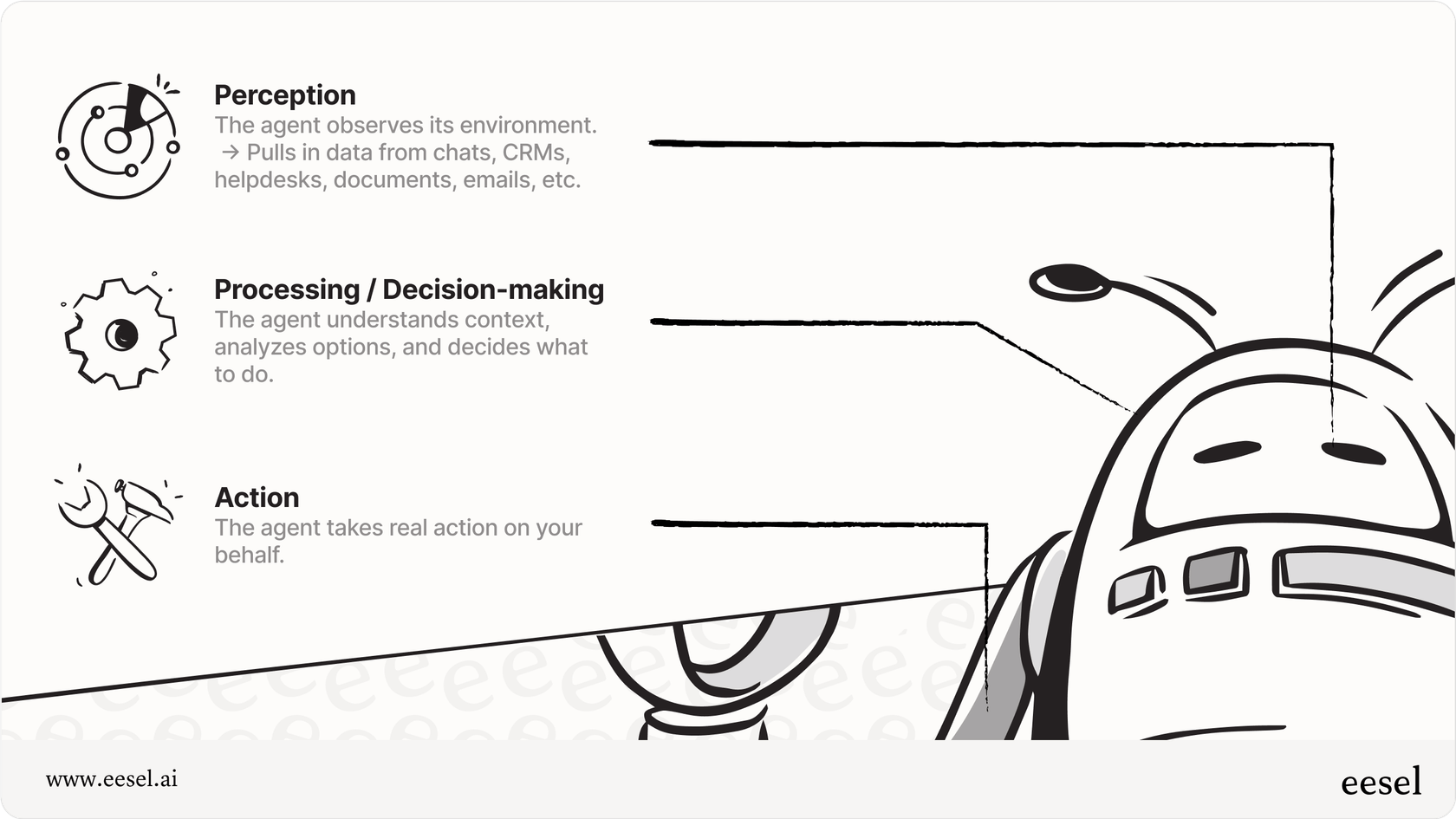
What are AI agents?
So, what exactly are AI agents? At their core, they're software systems built to operate with a level of independence. They're not just simple chatbots that stick to a script; they can actually understand context, reason, plan, and take action based on what's happening around them and what they're trying to achieve. They have key abilities like perception (that's gathering information), decision making (figuring things out and choosing a path), and the power to act (performing tasks or interacting with other systems).
Now, there are different types of agents depending on how complex they are and how they work (like simple reflex agents, goal-based agents, learning agents, or multi-agent systems). But what's really exciting is seeing these ideas put into action in real business situations. Their strength comes from being able to do more than just create text or give info; they can actually do things to get a result. That's what really sets them apart from simpler AI helpers or bots that mostly just react to what you type or follow basic rules .
How we chose these AI agent examples
When we went looking for the best practical ai agent examples to show you, we focused on a few key things. We really wanted to highlight how these agents are being used right now, not just talk about theories.
Here's what we looked for:
-
Real-world use: The examples had to be things businesses are using today or could clearly put into action pretty easily.
-
Actual impact: They needed to show clear benefits, whether that's saving time, cutting costs, or making things better for customers or employees.
-
Clear job: Each example represents a different way AI agents can be used or a different industry they fit into, showing you the range of possibilities.
-
Relevant areas: We made sure to cover different parts of a business, including key functions like customer support and internal operations, where AI agents are making a big splash.
Top 10 AI agent examples
These examples really show off the different things AI agents can do today. They're moving from cool concepts to becoming essential tools that help businesses run smoother and make experiences better across all sorts of industries.
1. Customer support and internal knowledge agents
eesel AI is a fantastic example of an AI agent platform built specifically to shake up customer support and how you manage internal knowledge. Think of it as a flexible AI agent solution that fits right into your existing systems, instead of making you ditch your current helpdesk or internal tools.
eesel AI works in two main ways:
-
AI Agent: This part lives inside your helpdesk, like Zendesk, Freshdesk, or Intercom. It can automatically handle simple, common tickets (like FAQs or checking order status) without needing a human agent. It's also smart enough to figure out where tickets should go, sending them to the right person or team, adding tags, and deciding which ones are most urgent. A really cool part is that it can actually do things by connecting to other systems using APIs. It can pull customer details from places like Shopify or BigCommerce or even manage tasks like processing refunds through custom API actions. And when a ticket does need a human touch, it passes it over smoothly with all the conversation history included.
-
AI Assistant/Copilot: This works alongside your human agents, often through a browser extension. It notices when an agent is working on a ticket and suggests draft replies. It can instantly grab specific documents or company rules from sources like Confluence, Google Docs, SharePoint, or Notion, and you can even chat with it about that content. It provides help that understands the situation, right within the agent's workflow, which saves time and helps them be accurate.
What makes eesel AI stand out is its ability to learn from your specific information, including past tickets (it can pull them in, turn them into knowledge articles you can review, and train the bot), your internal documents, and external wikis. You can really fine-tune the agent's tone and what actions it takes. You can even test out responses to make sure they're just right before you go live, and set up different bots for different teams or brands. Plus, paying per interaction is a budget-friendly option compared to paying per agent or per ticket solved, especially as you grow.
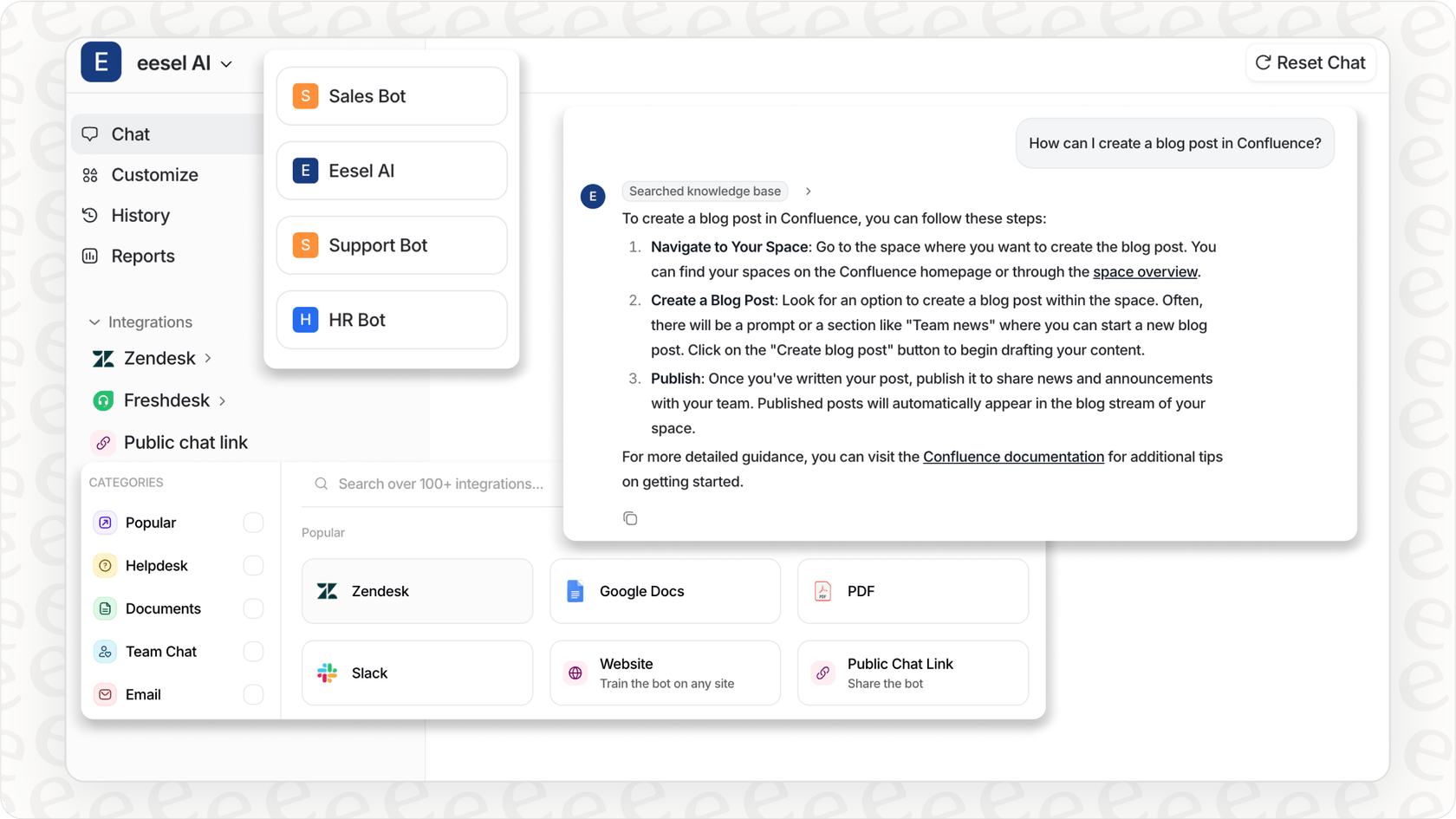
2. E-commerce assistant agents
These agents are built to make shopping online smoother and feel more personal. They act like helpful guides throughout someone's shopping journey.
You'll see examples like agents that:
-
Suggest products just for you based on what you've looked at, bought before, or told them you like.
-
Automatically give you order updates.
-
Remind you about stuff you left in your cart.
-
Even help you find products using pictures.
The big win here is boosting sales and making the whole customer experience better by giving people timely, useful info and little nudges.
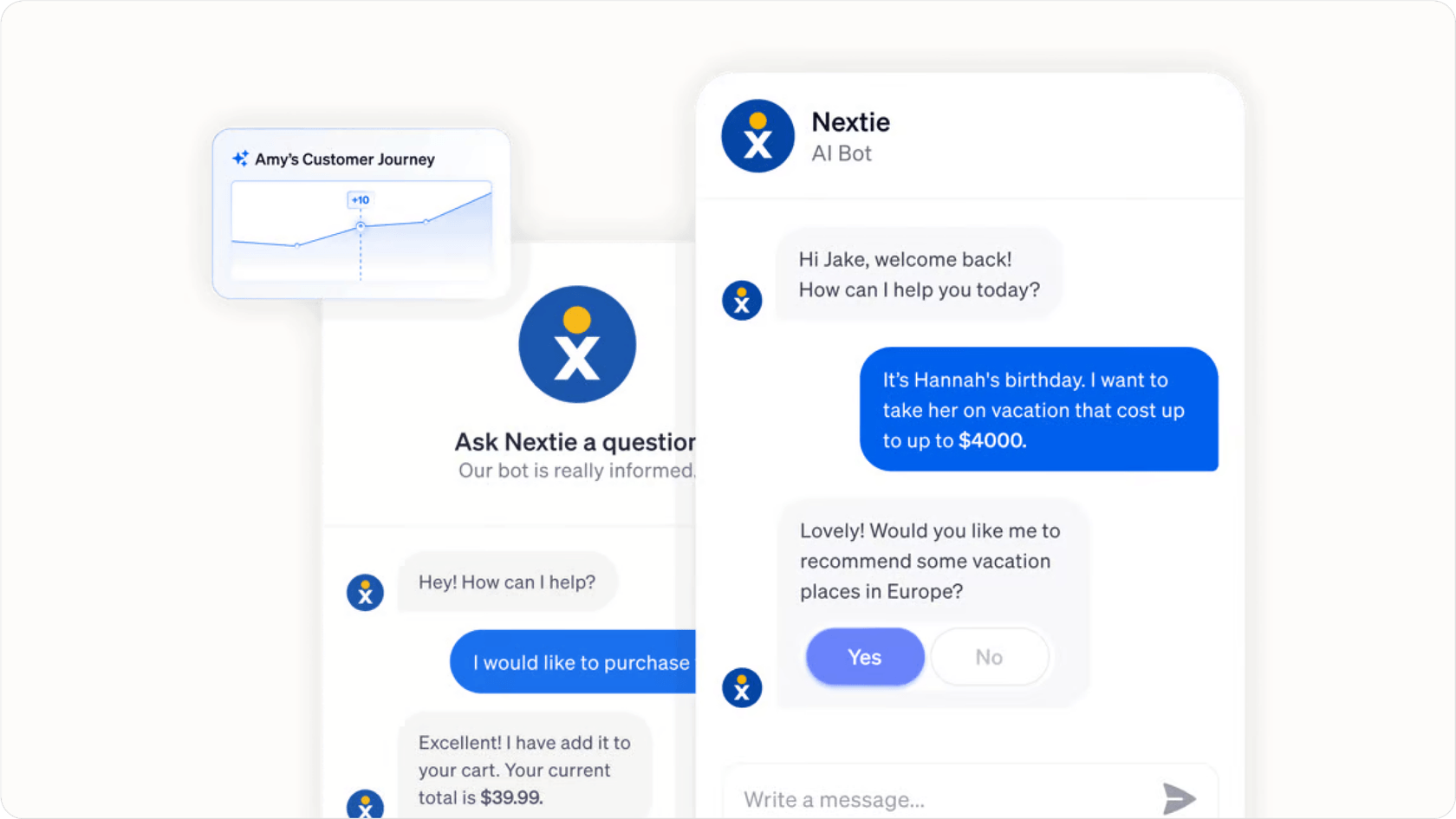
3. Sales and marketing automation agents
AI agents are becoming super valuable teammates for sales and marketing folks, taking on tasks that used to take a ton of manual work.
These agents can help:
-
Create targeted lists of potential customers by digging through lots of data.
-
Send personalized emails to many people at once.
-
Figure out if a lead is likely to buy (often better than humans can.
-
Even check out what competitors are doing to help plan your strategy.
For example, an agent might spot potential leads based on certain keywords in their industry and company size, then draft initial messages tailored to what that potential customer probably needs. A salesperson can then quickly review and send it.
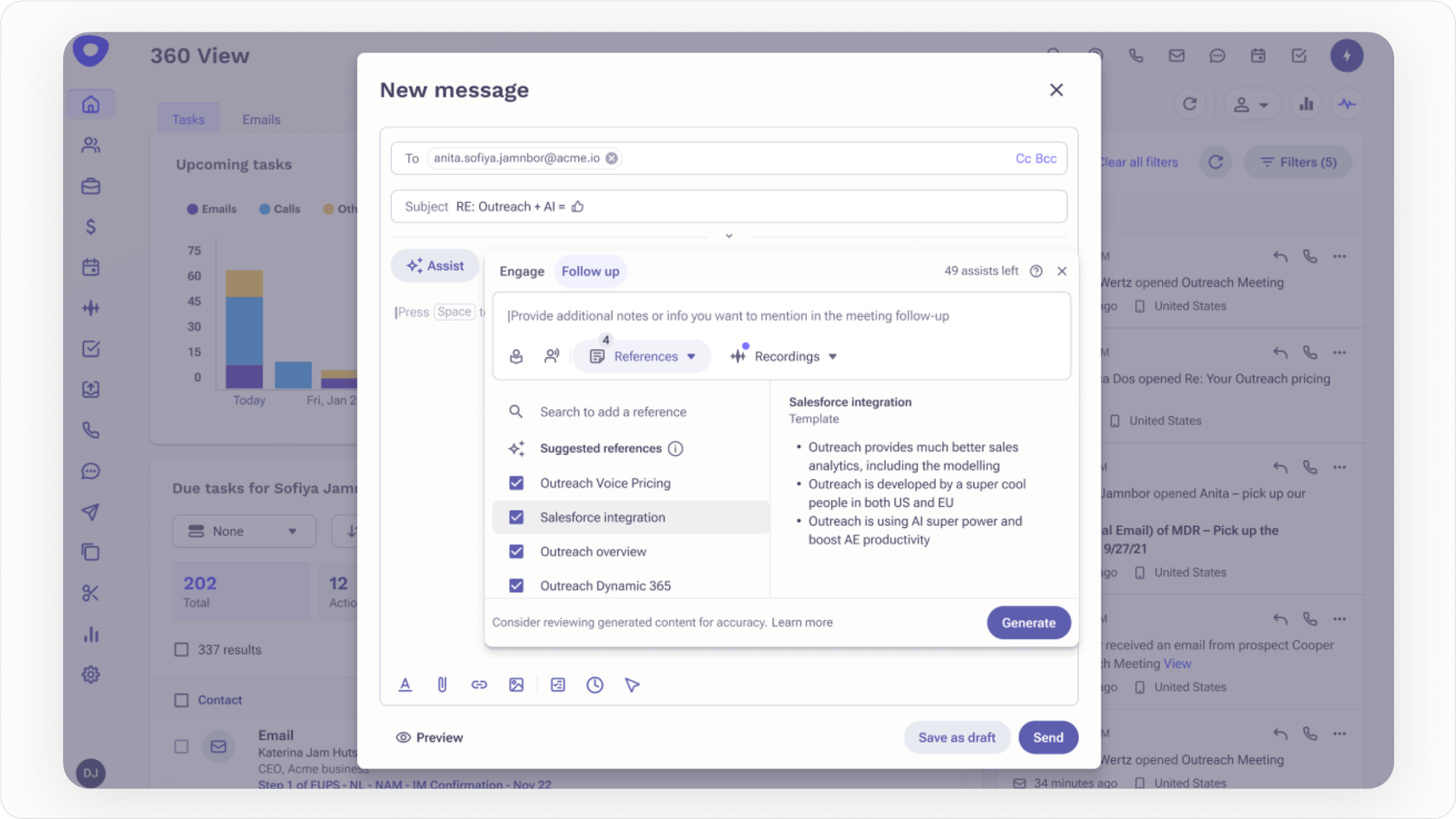
4. Financial fraud detection agents
In the finance world, being fast and accurate is everything, especially when it comes to security. AI agents are fantastic at watching transactions in real-time to spot and flag anything that looks fishy.
These agents analyze huge amounts of data instantly, looking for things that don't look like normal behavior or known ways scammers operate. They can flag unusual activity for a human to check out or even automatically do things like temporarily freeze an account or ask for more ID. Since scammers are always changing their tricks, these agents need to keep learning and updating how they spot fraud over time.
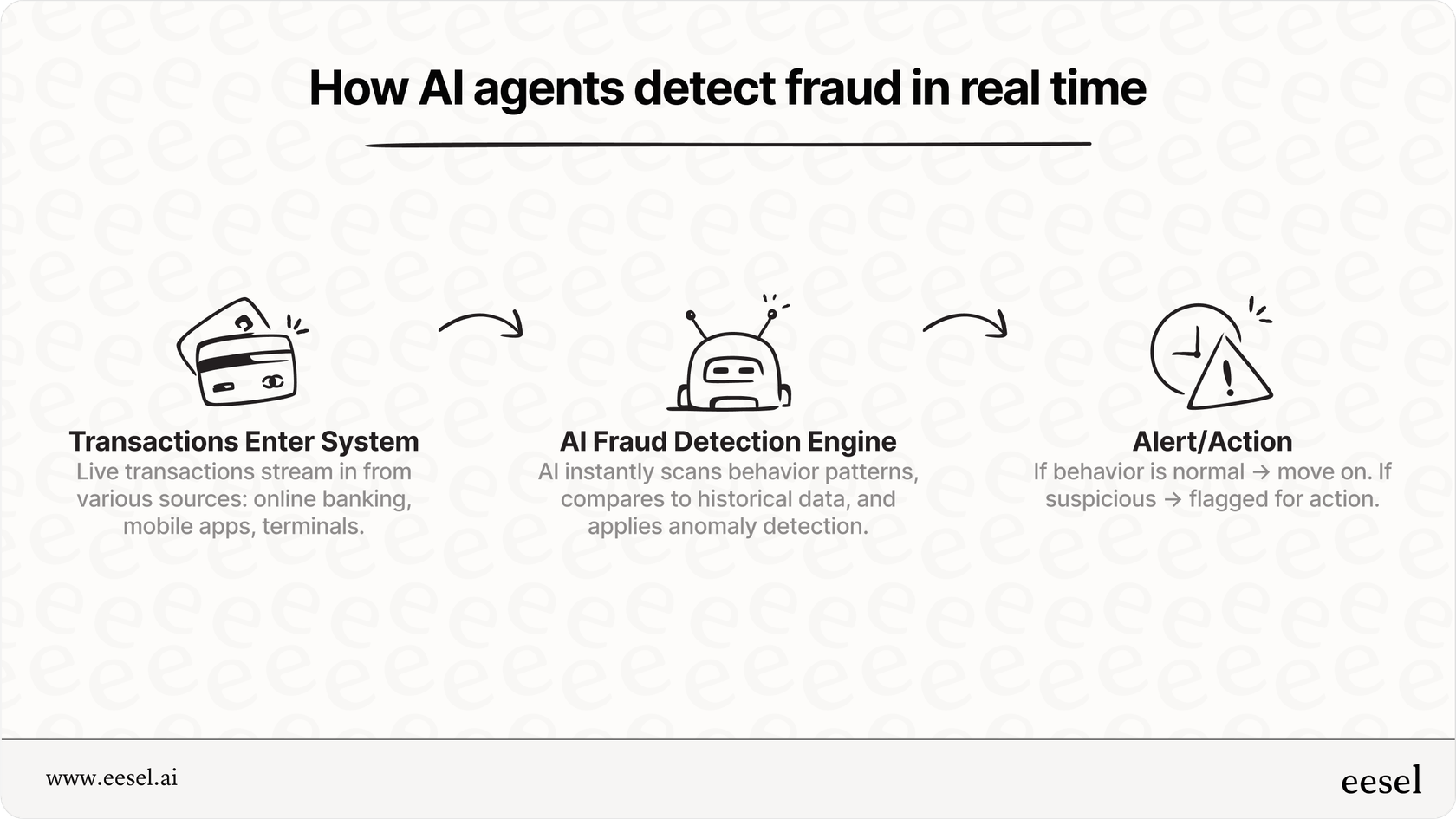
5. Supply chain and logistics optimization agents
Managing a complicated supply chain means juggling tons of things – like how much stuff you have, where your warehouses are, shipping routes, and delivery times. AI agents are perfect for making these complex networks run as smoothly as possible.
These agents can look at real-time info like traffic, weather, and stock levels to:
-
Find the best delivery routes.
-
Manage inventory across different warehouses.
-
Coordinate shipments between suppliers, manufacturers, and customers.
Picture an agent that sees a road is suddenly closed and automatically sends a fleet of delivery trucks on a different route to avoid delays and save on gas.
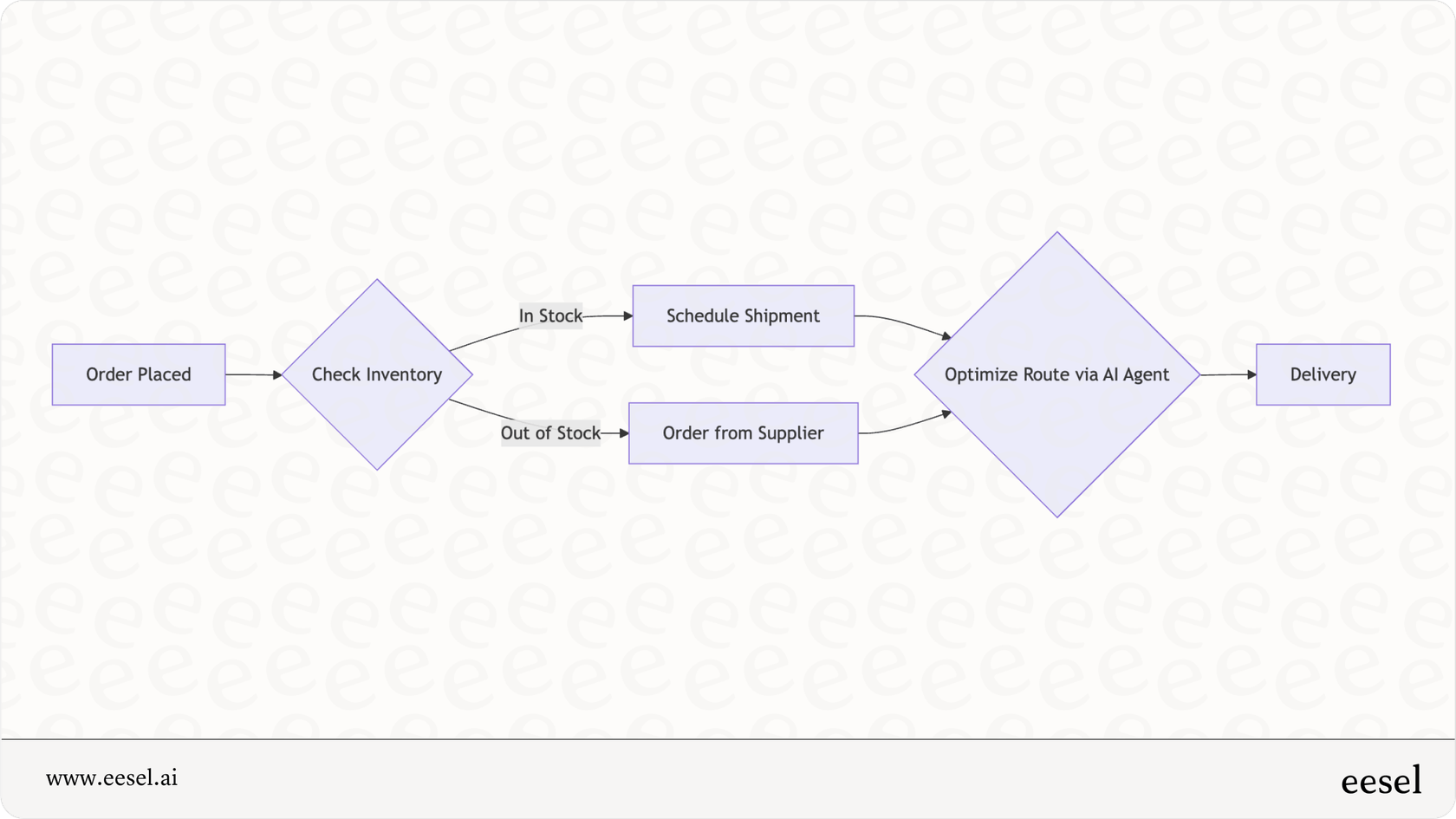
6. Healthcare administrative agents
When you think of AI in healthcare, you might picture complex diagnoses, but agents are also making a big difference behind the scenes, making things easier and more efficient for staff.
これらのエージェントは、直接的な患者ケアを含まないタスクを自動化できます。たとえば、次のようになります。
-
Booking appointments.
-
Handling patient forms.
-
Checking insurance details.
-
Managing staff paperwork.
An agent built into a hospital's website or app could let patients easily find open appointment times, book their visit, and even fill out necessary forms before they arrive, freeing up admin staff to focus on patients who need more personal attention.
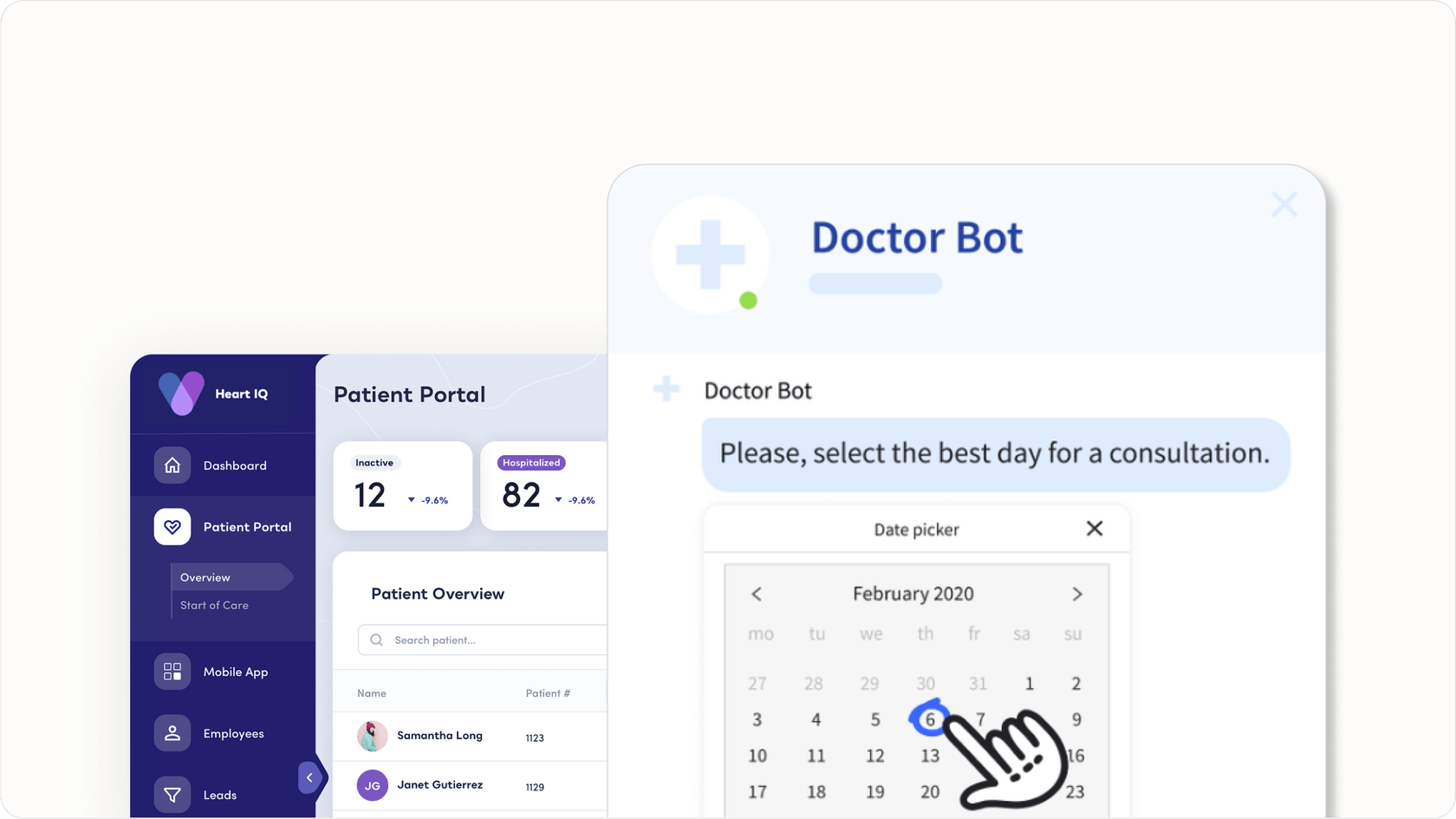
7. Human resources (hr) support agents
HR teams often get swamped with the same questions over and over about benefits, company rules, pay, and more. AI agents can give instant answers, making things better for employees and giving HR staff more time for bigger tasks.
These agents, often acting like helpful partners you can talk to, can:
-
Answer common employee questions about signing up for benefits, time off policies, or how things work at the company through a chat.
-
Walk employees through getting started when they join (onboarding).
-
Even suggest internal job openings that might fit their skills and career goals.
Solutions like eesel AI's Teammate AI offer similar features, connecting with internal chat tools like Slack or Microsoft Teams to give employees quick access to up-to-date company info.
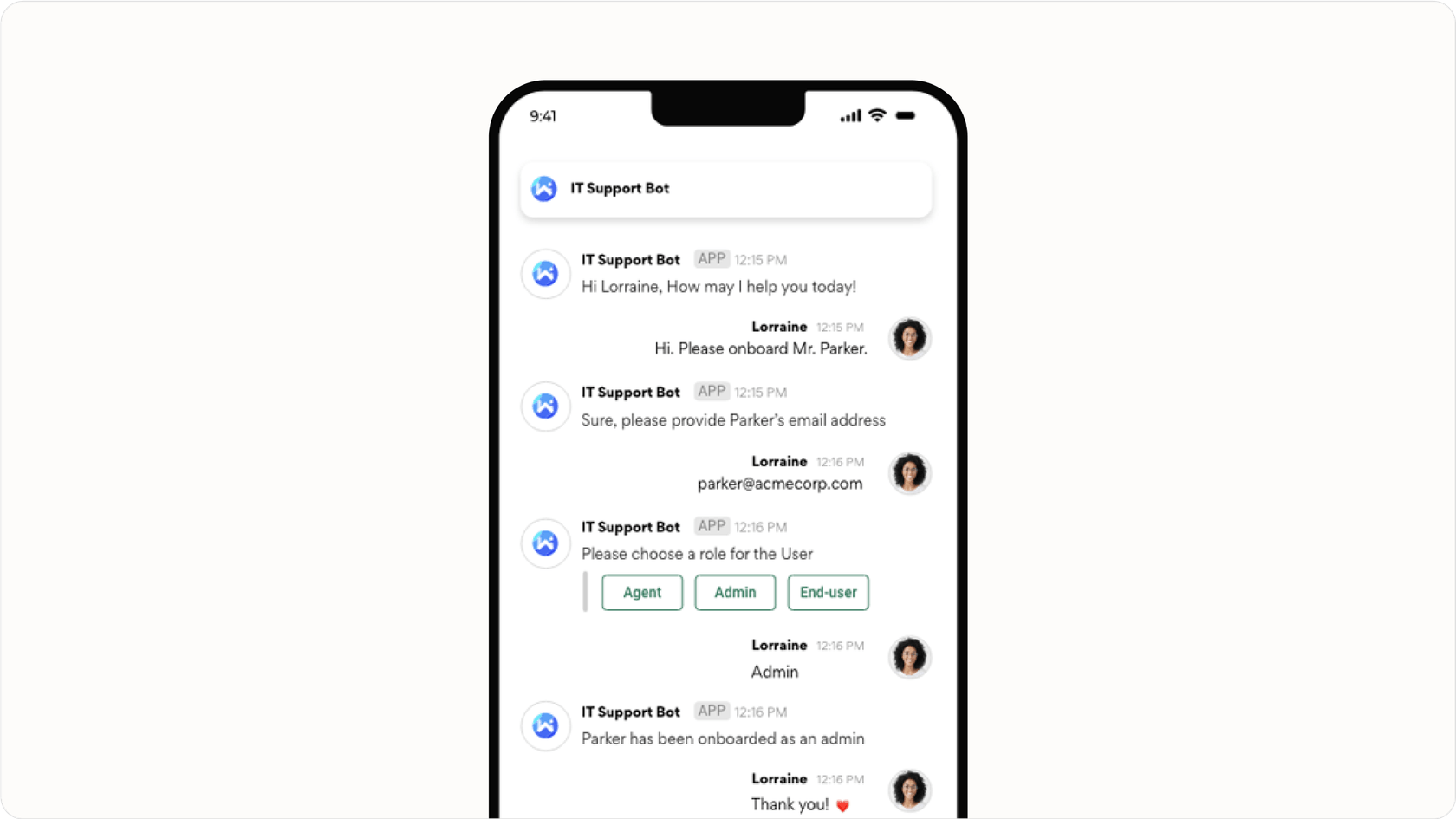
8. Internal IT help desk agents
Just like with customer support, internal IT teams often get flooded with common requests, from needing a password reset to figuring out why software isn't working. AI agents can automate these routine jobs, helping employees get back on track faster.
These agents can work quietly in the background or focus on specific goals. They can be linked up with internal chat tools or IT ticket systems like Jira Service Management. They can automatically:
-
Reset passwords.
-
Guide employees through fixing common software problems.
-
Smartly send more complicated issues to the right IT expert.
Imagine an agent in Slack or Microsoft Teams that an employee can just message when their VPN is acting up. The agent could walk them through the usual fixes or automatically create a ticket if they still need help. eesel AI's Teammate AI provides this kind of internal knowledge access.
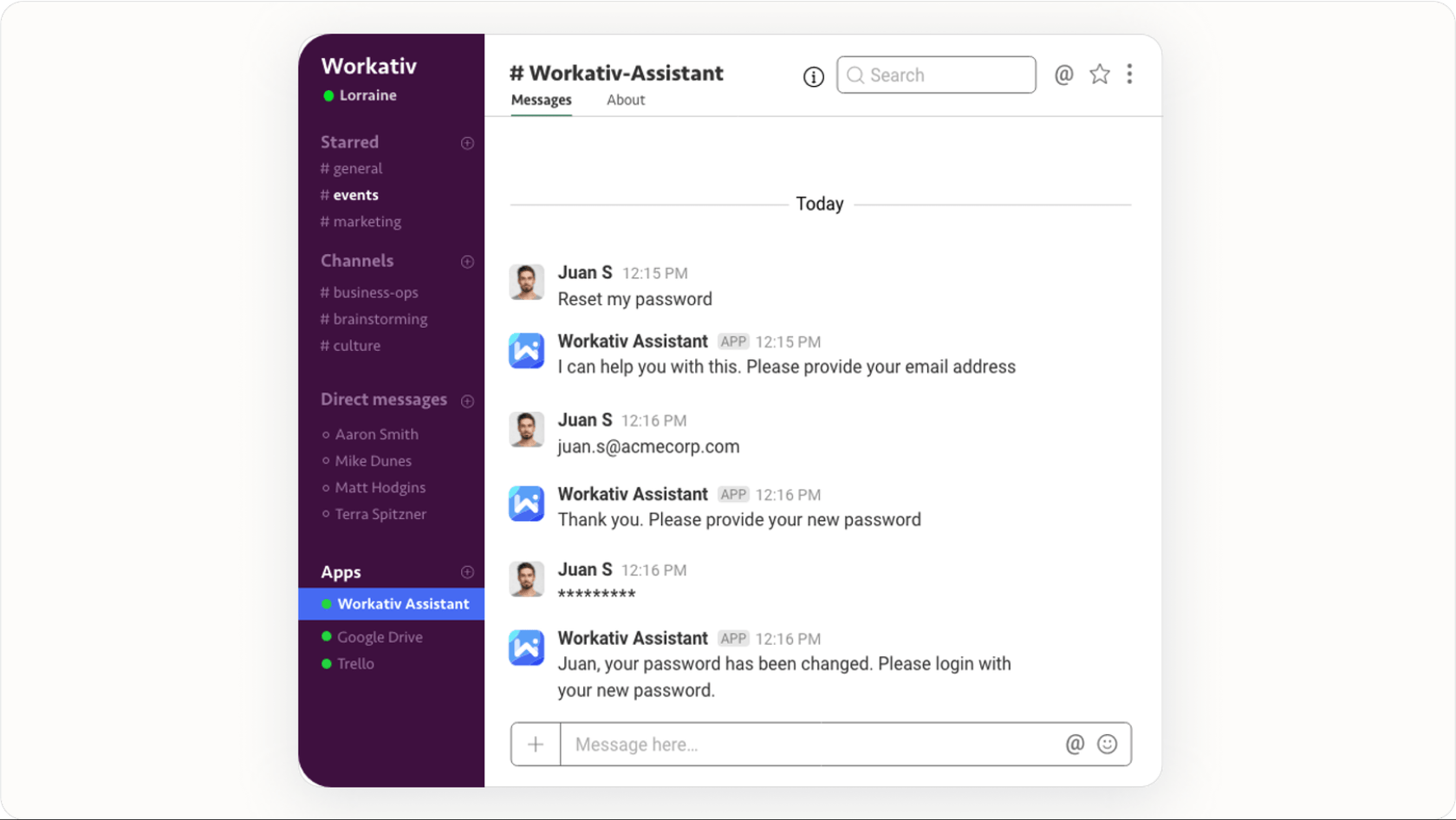
9. Content analysis and generation agents
Dealing with large amounts of text, data, or documents can eat up a lot of time. AI agents can lend a hand by quickly looking through, summarizing, and even creating content.
These agents can work as **data agents** or **creative agents**. They can:
-
Give you a quick summary of long reports or documents.
-
Pull out key bits of info from things like customer feedback or research papers.
-
Even draft initial versions of emails, reports, or marketing copy.
For instance, an agent could read through hundreds of customer support tickets and give a short summary of the most common problems or how customers are generally feeling about a product, which a product team could then review. eesel AI's Assistant can help human agents by summarizing tickets or getting information from knowledge sources to draft replies quickly.
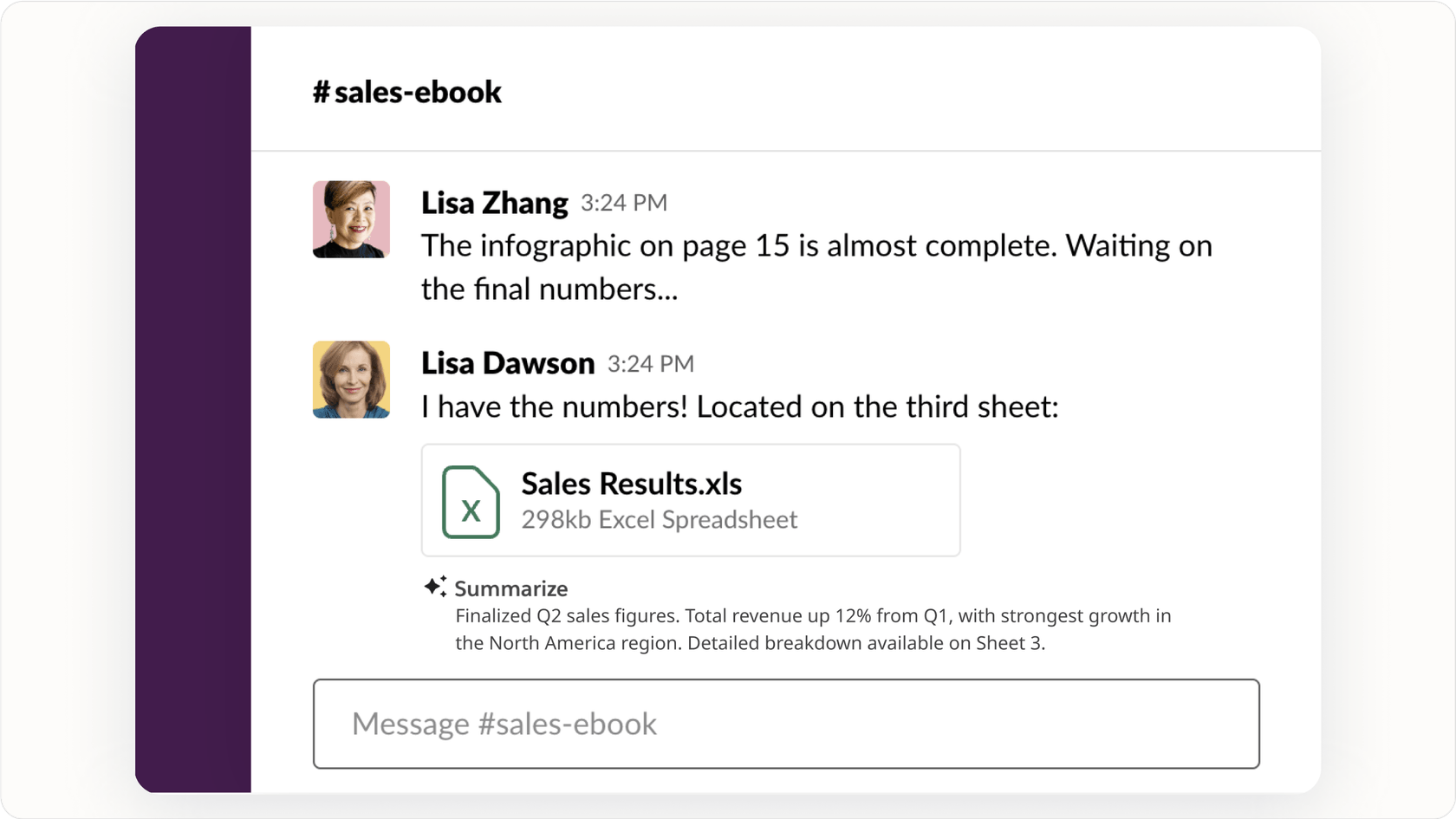
10. Manufacturing and robotic agents
In factories and industrial settings, AI agents often show up as physical robots, doing precise, repeated tasks really efficiently.
These robotic agents work on assembly lines, doing jobs like:
-
Welding.
-
Painting.
-
Putting parts together.
More advanced setups manage several robots or make entire production schedules run smoother. A higher-level agent might oversee the whole production flow, while the robots below it handle specific steps with accuracy, making sure quality is consistent and more gets made.

Comparing AI agent use cases and types
While the examples we just went through show what AI agents can do, it's helpful to see how different types of agents are a better fit for different jobs. Understanding the basic type of agent can give you a better idea of what it's good at and where it might have limits.
| Use Case Area | Primary Agent Type(s) | Best Suited | Key Benefit |
|---|---|---|---|
| Customer Support (Tier 1) | Reactive, Goal-Based, Learning | Instant responses | Reduced agent workload |
| Internal Knowledge Access | Learning, Interactive Partner | Fast info retrieval | Consistent answers |
| E-commerce Recommendations | Utility-Based, Learning | Increased sales | Personalized experience |
| Fraud Detection | Learning, Utility-Based | Proactive identification | Of risks |
| Supply Chain Optimization | Goal-Based, Multi-Agent | Improved efficiency | Reduced costs |
| Healthcare Admin | Reactive, Goal-Based | Streamlined processes | Reduced errors |
| HR Support | Interactive Partner, Learning | Accessible information | Faster resolution |
| Internal IT Help Desk | Autonomous Background, Goal-Based | Automated troubleshooting | Faster routing |
| Content Analysis/Gen | Creative, Data | Increased productivity | Faster insights |
| Manufacturing Automation | Robotic, Hierarchical | High precision | Increased throughput |
Choosing the right AI agent for your business
With so many ways to use AI agents, how do you figure out where to start or which one makes the most sense? Here are some quick pointers to help.
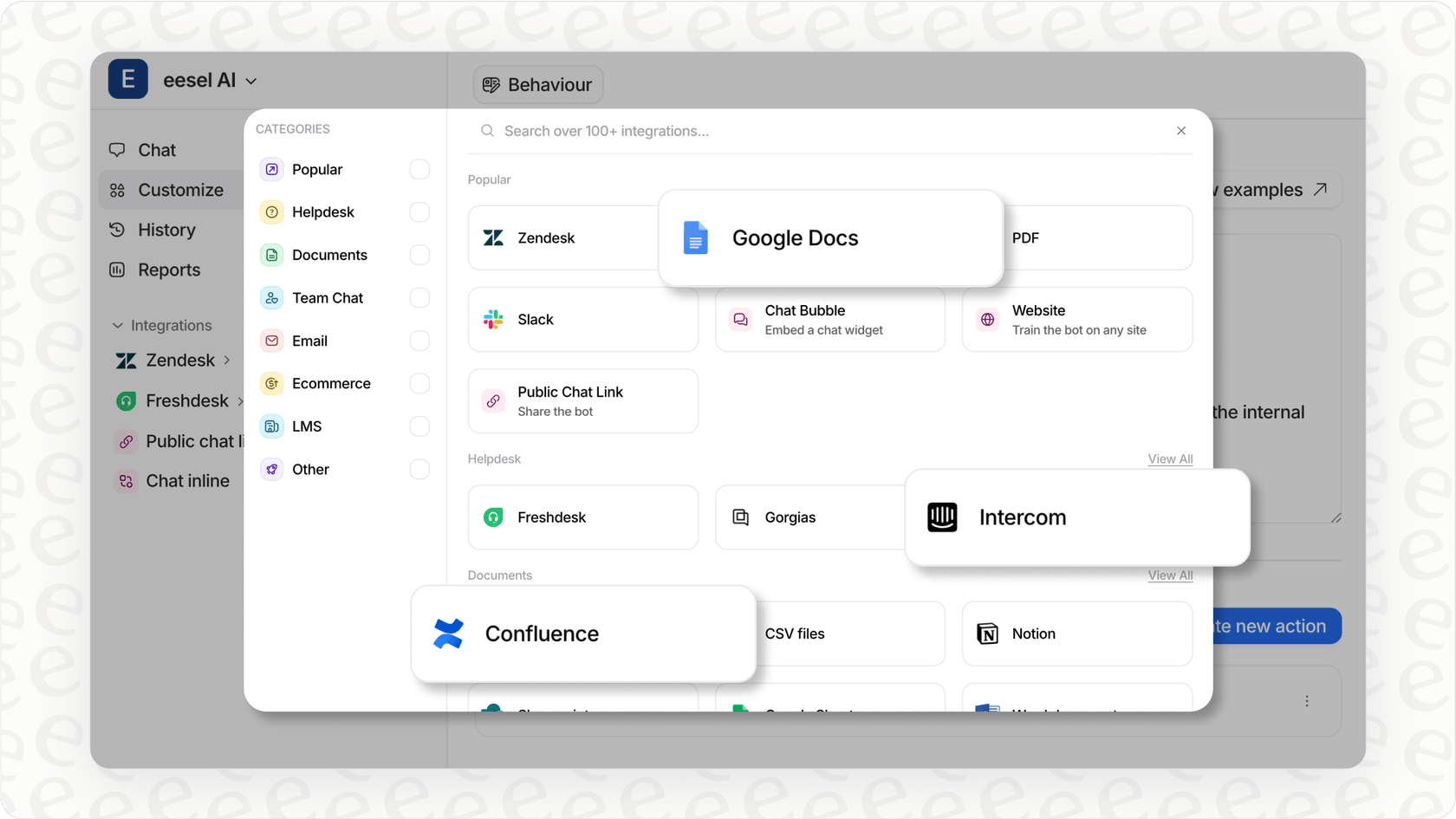
-
Pinpoint your biggest headaches and goals: Look at where your team spends the most time on repetitive tasks or where things often get stuck. Is your support team buried in tickets? Is finding internal info always a pain? Knowing the problem clearly helps you pick an agent built to solve it.
-
Think about task complexity and independence: Do you just need an agent that answers pre-set questions (Reactive), or one that plans multiple steps (Goal-based), or works with other systems (Multi-agent)? Match the agent’s abilities to your needs. Avoid choosing a more complex agent than necessary, but make sure it can handle important details.
-
Check how well it integrates with your tools: An AI agent is most powerful when it connects easily with your helpdesk (Zendesk, Freshdesk, Gorgias, Jira Service Management), knowledge base (Confluence, Google Docs), and chat tools (Slack, Microsoft Teams). Look for platforms with wide integration options, like eesel AI’s 100+ integrations.
-
Look for strong training and customization. Agents trained only on general info won’t understand your brand or style. The best agents learn from your past tickets, documents, and FAQs. Customizing tone, actions, and handoffs ensures it fits your brand. eesel AI lets you do this and gives full control over how your agent acts.
-
Understand the pricing model. Providers can charge per agent, per resolution, or per interaction. Some helpdesk add-ons, like Zendesk’s Advanced AI, charge both per agent and per solution, making costs unpredictable. A clear per-interaction model, like eesel AI’s, helps you budget and scale without surprise charges.
-
Test thoroughly before launch. You need to test accuracy, review how it handles scenarios, and adjust before going live. Tools that support simulations and provide clear reports, like eesel AI, help you launch with confidence and ensure safety and brand consistency.
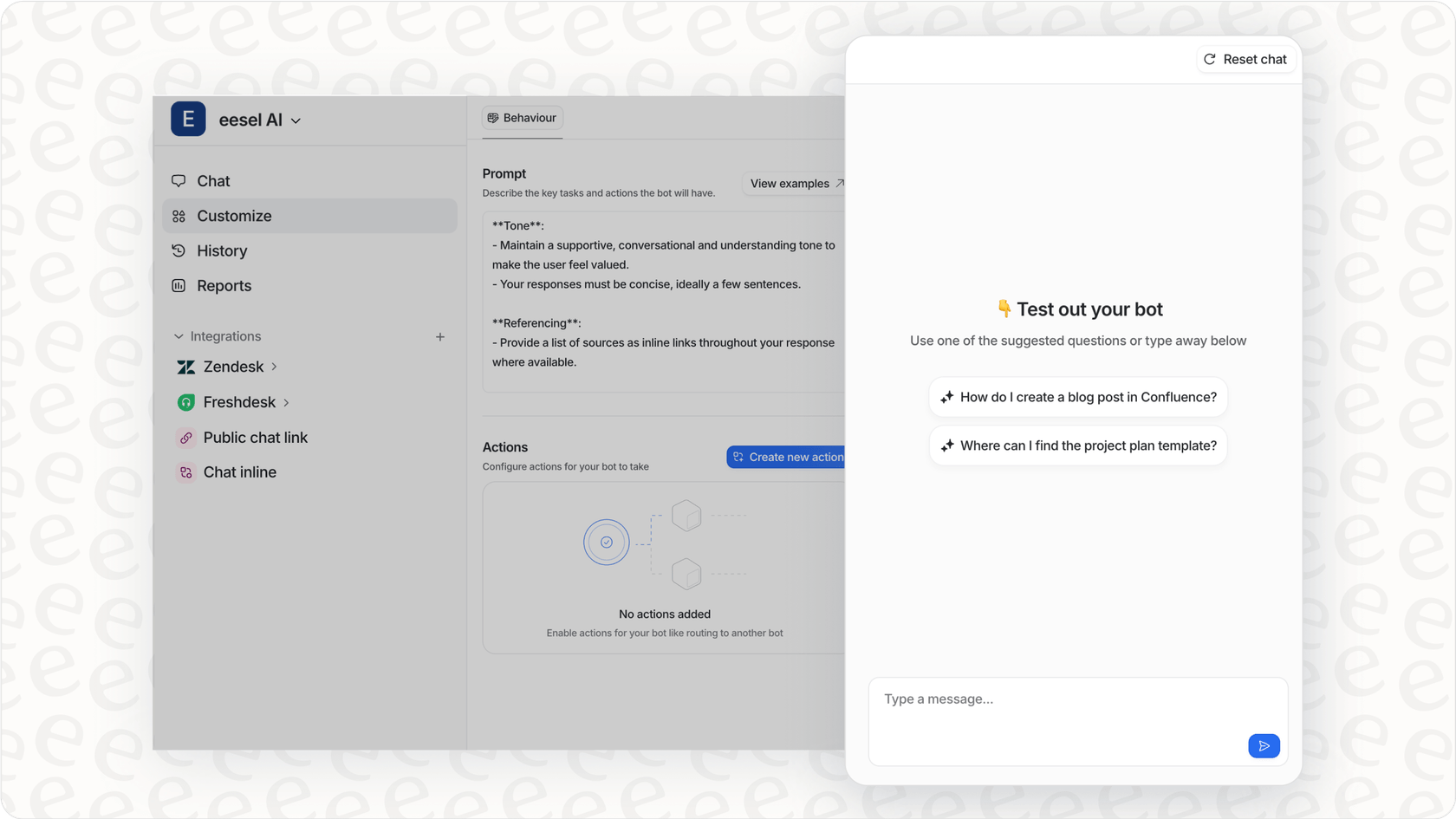
Ready to check out AI agent examples for your business?
AI agents aren't just cool ideas for the future anymore; they're practical tools that are getting real results across different industries, from automating customer support to making internal operations run better. Picking the right AI agent solution depends on what you specifically need, but focusing on whether it actually helps, how well it connects with your current tools, how flexible it is to train, and how clear the pricing is will set you up for success.
For businesses looking to use AI agents specifically for customer support and managing internal knowledge, solutions like eesel AI offer a powerful, flexible, and cost-effective choice compared to tools built directly into helpdesks. Its ability to learn from your unique data, connect deeply with the platforms you already use, and provide predictable pricing makes it a great option for teams ready to automate smartly and give their human teams a boost.
See firsthand how an AI agent can change your support and internal workflows for the better.
Start a free trial with eesel AI today (no credit card needed) or book a demo to chat about what you need.
Share this post

Article by
Kenneth Pangan
Writer and marketer for over ten years, Kenneth Pangan splits his time between history, politics, and art with plenty of interruptions from his dogs demanding attention.






